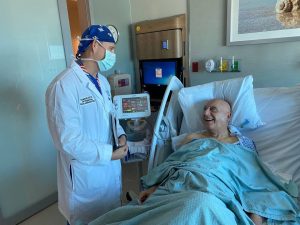Dick Vitale, College Basketball Broadcaster, Reveals New Cancer Diagnosis
Renowned college basketball broadcaster, Dick Vitale, recently disclosed a devastating new cancer diagnosis. The ESPN legend, widely recognized for his enthusiasm and passion for the game, revealed that he is battling lymphoma, a type of cancer that begins in the body’s immune system cells. This news comes just months after the sportscaster underwent successful treatment for melanoma, a skin cancer. Despite the challenging circumstances, Vitale remains resolute, displaying admirable courage and resilience in the face of adversity. His determination is not only an inspiration to his fans and fellow sports enthusiasts but also a testament to his character.
The 82-year-old broadcaster, beloved for his catchphrases and effervescent personality, expressed his commitment to continue working while undergoing treatment. Throughout his illustrious career, Vitale has been an influential figure in the world of college basketball. This recent diagnosis has elicited an outpouring of support from the sports community as he commences his battle against cancer. Despite the daunting journey ahead, Vitale’s spirit remains unbroken, proving once again, his love for the game transcends beyond the commentary box. He remains hopeful for a positive outcome, demonstrating his undeterred optimism and unwavering strength.

Details of Dick Vitale’s Latest Cancer Diagnosis
In 2021, legendary basketball broadcaster Dick Vitale revealed a poignant update about his health. The 82-year-old ESPN personality announced that he has been diagnosed with lymphoma, marking his second battle with cancer within a short span. Lymphoma is a type of cancer that starts in cells that are part of the body’s immune system. This diagnosis came just months after Vitale underwent successful treatment for melanoma, a type of skin cancer. He shared the news publicly on social media, expressing his determination to fight this new challenge with resilience and courage. Vitale, known for his effervescent enthusiasm and vibrant commentary during college basketball games, has been a part of the ESPN family since its inception in 1979.
Throughout his career, he has been a staunch advocate for cancer research, raising funds and awareness through The V Foundation for Cancer Research, a charity he co-founded in honor of his friend and colleague, Jim Valvano. Despite the recent diagnosis, Vitale affirmed his commitment to continue working on ESPN’s college basketball broadcasts, a testament to his passion and dedication to the sport. His admirers around the world and the broader sports community have rallied behind him, offering messages of support and wishing him strength on this challenging journey. However, this diagnosis has also served to intensify his advocacy for cancer research, with Vitale using his platform to call for increased funding and support for medical research to find a cure.
Vitale’s Previous Battle with Cancer
Dick Vitale, a renowned sports broadcaster, has faced numerous challenges in his lifetime, but perhaps the most formidable was his battle with cancer. In the late 1990s, Vitale was diagnosed with Ulcerative Colitis, a condition that increases the risk of developing colon cancer. This led to him undergoing surgery to remove pre-cancerous polyps from his colon. His public announcement of his diagnosis and subsequent treatment not only highlighted his personal resilience but also brought attention to the importance of regular medical screenings for early detection of cancer. Vitale was fortunately able to overcome this health crisis and returned to his broadcasting career with an even stronger determination and spirit. Moreover, his experience with cancer profoundly impacted his life and inspired him to become an advocate for cancer research. He has since been actively involved in raising funds for the V Foundation for Cancer Research, contributing significantly to the fight against this life-threatening disease. Vitale’s previous battle with cancer is a testament to his strength and resilience, serving as a source of inspiration and hope for many. His journey underscores the value of early detection and the importance of research in saving lives and finding a cure for cancer.

Impact of the Diagnosis on Vitale’s Career
The diagnosis had a profound impact on Vitale’s career, causing significant shifts in his professional trajectory. Prior to the diagnosis, Vitale was a vibrant, energetic individual who was constantly on the move, always immersed in his work. He was a dedicated professional, known for his relentless work ethic and unwavering commitment to his career. However, the diagnosis changed everything. It forced him to slow down, reevaluate his priorities, and make substantial alterations to his lifestyle and work schedule.
Suddenly, Vitale found himself grappling with a myriad of health issues that threatened to derail his career. He had to undergo numerous medical treatments and procedures, which often left him physically drained and unable to perform his duties to the best of his abilities. His ability to work long hours and travel extensively for his job was severely compromised. The diagnosis also had a psychological impact, leading to bouts of anxiety and depression. Vitale found himself wrestling with uncertainty and fear, struggling to stay focused and motivated.
Despite these challenges, Vitale showed immense courage and resilience. He adapted to his new circumstances, finding ways to continue his work without compromising his health. He began to delegate more, relying on his team to handle tasks that he previously would have done himself. He also started to prioritize his wellbeing, integrating regular exercise and a balanced diet into his daily routine.
At the same time, the diagnosis gave Vitale a new perspective on his career. It reminded him of the importance of balance and self-care, and made him realize that while his career was important, his health was paramount. He learned to value his own wellbeing over professional success, and this shift in mindset had a profound impact on the way he approached his work.
In the end, the diagnosis did not end Vitale’s career; instead, it transformed it. It forced him to reevaluate, adapt, and grow, ultimately making him a stronger, more resilient individual. His career may have taken an unexpected turn, but Vitale’s spirit and determination remained undimmed. Through it all, he remained a beacon of resilience, proving that even in the face of adversity, one can still continue to strive for excellence and make a meaningful impact in their chosen field.
Public and Professional Reactions to the News
Public and professional reactions to news developments vary extensively and are often influenced by diverse factors. These factors include personal beliefs, professional affiliations, societal norms, and cultural backgrounds, among others. Often, the way news is presented significantly impacts the reaction it receives. For example, a sensationalized headline can arouse strong public emotions, sometimes leading to hasty judgments.
Professionals, especially those in media, academia, and politics, tend to scrutinize news more critically. They typically dissect information, consider various perspectives, and evaluate the potential implications before forming an opinion. Therefore, their reactions usually carry more weight and can influence public opinion.

However, the advent of social media has blurred the line between public and professional reactions to the news. Everyone with an internet connection can share their viewpoint, creating an environment where a multitude of voices are heard. This digital democratization has its pros and cons. On one hand, it allows for a diversity of opinions, fostering a more inclusive public discourse. On the other hand, it can amplify misinformation and contribute to the polarization of views.
Regardless of the platform or the perspective, reactions to the news serve as a barometer of society’s prevailing views and sentiments. They reflect the zeitgeist – the spirit of the times. They can also influence policy decisions, shape societal norms, and even change the course of history. Therefore, it is essential to foster a news culture that values accuracy, fairness, and respect for diverse viewpoints. In this fast-paced, information-saturated world, it is more crucial than ever to understand not just the news itself, but also the reactions it provokes. These reactions, whether they come from the public or professionals, are an integral part of the news ecosystem and play a vital role in shaping our understanding of the world.
Dick Vitale’s Response and Future Treatment Plans
Renowned ESPN basketball analyst, Dick Vitale, recently revealed his ongoing battle with multiple health challenges, including lymphoma. This has sparked discussions about his future treatment plans. Vitale, widely celebrated for his charismatic reporting style and in-depth hoops knowledge, is expected to undergo a rigorous treatment regimen to combat the disease. He has publicly expressed his determination to fight, stating that he will not let the illness dictate his life.
His treatment plan is anticipated to involve chemotherapy, a common form of treatment for lymphoma. This approach uses medication to destroy cancer cells. Despite the potential side effects, which can include fatigue and hair loss, it is often successful in slowing the progression of the disease and in some cases, even leading to remission. Vitale’s medical team will likely monitor his progress closely, adjusting the treatment plan as necessary based on his body’s response to the chemotherapy.
Vitale’s positive, fighting spirit in the face of adversity has been inspiring to many, as he continues to remain active on social media platforms, sharing updates about his health condition. He has also been using his platform to raise awareness about the importance of regular health check-ups and early detection of diseases. His openness about his health challenges and treatment has also been seen as a way to reduce the stigma associated with cancer.
His long-term prognosis remains uncertain, but Vitale’s strength and optimism are undoubtedly a source of inspiration for many. His future plans also include continuing his work as a passionate advocate for pediatric cancer research and fundraising. Despite the challenges posed by his health condition, Vitale’s enthusiasm for life and his commitment to his work remain undeterred. He has stated that he plans to continue his broadcasting duties as long as he is able, demonstrating his undying passion for the sport of basketball.
